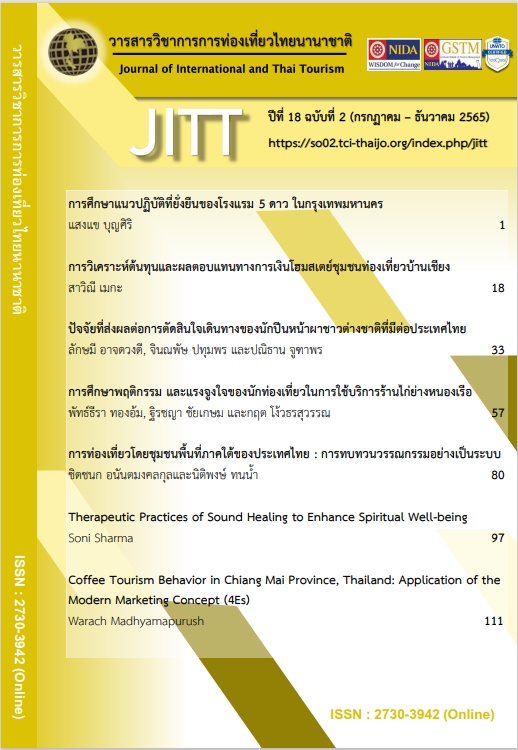การศึกษาแนวปฏิบัติที่ยั่งยืนของโรงแรม 5 ดาวในกรุงเทพมหานคร The Study of Sustainable Practices for 5Star Hotels in Bangkok
Main Article Content
บทคัดย่อ
การวิจัยนี้มีวัตถุประสงค์เพื่อศึกษาระดับการรับรู้แนวปฏิบัติที่ยั่งยืนระดับความผูกพันต่อองค์การ และสำรวจความสัมพันธ์ของแนวปฏิบัติที่ยั่งยืนและระดับความผูกพันต่อองค์การของพนักงานโรงแรม 5 ดาวในกรุงเทพมหานคร กลุ่มตัวอย่าง จำนวน 138 คน วิธีการสุ่มตัวอย่างแบบสะดวก (Convenient Sampling) เครื่องมือที่ใช้ในการวิจัย คือ แบบสอบถาม วิเคราะห์ข้อมูลโดยใช้สถิติเชิงปริมาณ ได้แก่ ความถี่ ร้อยละ ค่าเฉลี่ย ส่วนเบี่ยงเบนมาตรฐาน การวิเคราะห์ความแปรปรวน (One-Way ANOVA) และการวิเคราะห์ค่าสัมประสิทธิ์สหสัมพันธ์เพียร์สัน (Pearson’s Correlation Coefficient)
ผลการวิจัยพบว่า ระดับการรับรู้เกี่ยวกับแนวปฏิบัติที่ยั่งยืนโดยรวมอยู่ในระดับสูง ในด้านผลประโยชน์ต่อสิ่งแวดล้อมมีระดับการรับรู้ของพนักงานสูงที่สุด รองลงมาได้แก่ด้านการบริหารจัดการด้านความยั่งยืนที่มีประสิทธิภาพ ด้านผลประโยชน์ต่อมรดกทางวัฒนธรรม และด้านผลประโยชน์ทางสังคมและเศรษฐกิจ ตามลำดับ ระดับความผูกพันต่อองค์การโดยภาพรวมอยู่ในระดับสูง มีค่าเฉลี่ยของความผูกพันด้านบรรทัดฐานของพนักงานสูงที่สุด ค่าเฉลี่ยของความผูกพันด้านจิตใจ และด้านการคงอยู่ มีค่าลดลงตามลำดับ และความสัมพันธ์ระดับการรับรู้แนวปฏิบัติอย่างยั่งยืนกับระดับความผูกพันต่อองค์การพนักงานโรงแรมห้าดาวในกรุงเทพมหานครโดยภาพรวมพบว่ามีความสัมพันธ์กันในระดับสูง อย่างมีนัยสำคัญทางสถิติที่ระดับ 0.01 (r = .751)
คำสำคัญ : แนวปฏิบัติที่ยั่งยืน ระดับความผูกพัน โรงแรม
Article Details

อนุญาตภายใต้เงื่อนไข Creative Commons Attribution-NonCommercial-NoDerivatives 4.0 International License.
เอกสารอ้างอิง
Ahmed, H. A., Thowayeb, H.H., & Mohammed, M. E. (2020). A Descriptive of Green Hotel Practices and Their Role n Achieving Sustainable Development. Sustainability 2020, 12, 9624; doi:10.3390/su12229624.
Alipour, H., Safaeimanesh, F., & Soosan, A. (2019). Investigating Sustainable Practices in Hotel Industry from Employees' Perspective: Evidence from a Mediternean Island. Faculty of Tourism, Eastern Mediterranean University.
Cohen, J. (1977). Statistical power analysis for the behavioral sciences. New York: Academic
Faul, F., Erdfelder, E., Lang, A. G., & Buchner, A. (2007).
Faul, F., Erdfelder, E., Lang, AG. et al. G*Power 3: A flexible statistical power analysis program for the social, behavioral, and biomedical sciences. Behavior Research Methods 39, 175–191 (2007). https://doi.org/10.3758/BF03193146ods, 39, 175-191
Cohen, J. (1988). Statistical power analysis for the behavioral sciences. 2nd ed. New Jercy: Erlbaum.
Faul, F., Erdfelder, E., Lang, AG. et al. (2007). G*Power 3: A flexible statistical power analysis program for the social, behavioral, and biomedical sciences. Behavior Research Methods 39, 175–191. https://doi.org/10.3758/BF03193146
GSTC (Global Sustainable Tourism Council). (2013). Global Sustainable Touriam Criteria for Hotel and Tour Operators. Washington DC: Global Sustainable Tourism Council.
Kapera, I. (2018). Sustainable Development in The Hotel Industry: Between Theory and Practice in Poland. Turyzm / Tourism, 28(2).
Lee, J. H. (2012). A ntecedents and Consequences of Employee Engagement: Empirical study of Hotel Employees and Managers. Department of Hospitality Management and Dietelics, College of Human Ecology, Kansas State University.
Manning, T. (1999). Indicators of Tourism Suatainability. Tourism Management, 20, 179 - 181.
Meyer, J. P., & Allen, N. J. (1991). A three-component conceptualization of organizational commitment. Human Resource Management Review, 1(1).
Mowday, R. T., Porter, L. W., & Steers, R. M. (1982). Employee organization linkages: The psychology of commitment, absenteeism, and turnover. New York: Academic Press.
Peter. J., & Daphane, C. (2019). Sustainable Development Goals and the World’s Leading Hotel Groups. Athens Journal of Tourism. Volume 6, Issue 1, page 1-14.
Steers Richchard M. (1977). Antecedents and Outcome of Organizational Commitment. Administrative Science quarterly. 22 January.
The Global Sustainable Tourism Council (2012). GSTC Criteria for Hotels & Tour Operators’ version 2. Retrieved from https://www.gstcouncil.org/wp-content/uploads/2017/01/Thai-GSTC---H_TO-v2.pdf.
Weerapan & Tanayu, et al. (2018). ความผูกพันต่อองค์กรของพนักงานโรงแรมในอำเภอเกาะสมุย จังหวัดสุราษฎร์ธานี. วารสารการบริการและการท่องเที่ยวไทย. ปีที่ 13 ฉ. 2.
World Tourism Organization. (2021). Global tourism sees upturn in q3, but recovery remains fragile (UNWTO). UNWTO
Xie, L. (2020). Sustainable Tourism: Why Should Hotels Lead in This Effort? Retrieved from https://www.hospitalitynet.org/opinion/4096615.html.


